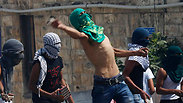
'Jerusalem intifada is not result of past two months' events, but of past two decades' failures'
צילום: רויטרס
Neglect leading to Jerusalem's division
Op-ed: There is nothing our politicians are more afraid of than Jerusalem. And when they are afraid, no decisions are made and the situation is ignored. This is how an intifada develops.
Between Mount Scopus and the Old City walls, Jerusalem has no governance. There is only anarchy and some Border Guard officers, when they remember to send them there.
The city joined together is holding up a mirror to the face of all politicians and all familiar clichés – and the reflection is unpleasant.
A new intifada has erupted in East Jerusalem in recent months, without anyone declaring it. Stones are being thrown, dustbins are being torched and stores are being plundered. Entire neighborhoods are closed for security reasons.
Every big city in the world has quarters which one should not enter late at night. In other big cities there are neighborhoods one should stay away from completely. The difference between here and there is the geography of fear.
Tough neighborhoods are always on the margins, far from the public eye, far from the average tourist. In Jerusalem, on the other hand, the conflict is packed into one center. The governance gaps between the western and eastern parts of the city stand out.
About two years ago, I drove to a tour of the Mount of Olives. Under the observation post, route markers are buried: Eliezer Ben-Yehuda, the father of modern Hebrew, Nobel Prize laureate writer Shmuel Yosef Agnon, Rabbi Yoel Moshe Salomon, Rabbi Abraham Isaac Kook and former prime minister Menachem Begin. The Zionist story in all its colors.
On our way, as I was driving on the winding road which has no space and no traffic lights, I was pelted with stones. We continued driving. We ignored it, because there was nothing else we could do. When I got home, I sat down to write – to express my frustration in words.
Last week, an innocent family took a wrong turn and entered the Wadi al-Joz neighborhood on its way to a swearing-in ceremony of the Golani Brigade at the Western Wall in Jerusalem. They were using Waze – an Israeli navigation app which, like most programmed and intelligent Israelis, finds it difficult to distinguish between one Jerusalem neighborhood and another.
The mistake resulted in shattered windowpanes and a slight trauma. They escaped unharmed. The soldier who was seriously wounded not far from there, after being shot by a Palestinian on a motorcycle, was not as lucky. The same applies to some of the residents of the French Hill neighborhood, where the lack of governance has become part of their routine.
Every person has a city named Jerusalem. Every politician has promises about Jerusalem. How many of them really know Jerusalem? How many of them really delve into its problems?
The Jerusalem intifada is not the result of the events of the past two months, but of the failures of the past two decades. Israel united and annexed, enacted a basic law, but actually ignored the situation.
The main problem is the municipal area. In 1967, Arab villages and neighborhoods which were never included in Jerusalem became part of the city. It was a historical navigation error, which created 250,000 people with Israeli identity cards but with no Israeli government.
Instead of nurturing East Jerusalem's historic neighborhoods, the Old City's surroundings, the outskirts of the Mount of Olives and the other original Jerusalemite parts, in order to make the Israeli ownership clear – they were all neglected equally.
Most of us are unaware of the fact that the Jerusalem neighborhoods outside the separation fence are a governance parody. At the entrance, there are signs forbidding Israelis to enter. The mayor doesn’t visit the area, and neither do the police. The National Insurance funds, on the other hand, arrive on time.
Jerusalem must not be divided. Generations of Jews arrived here for the sake of Zion. But the current reality is leading there – not in a constitutional way, not because of an agreement that won't arrive, but in the name of neglect. If Jews can't enter a neighborhood under the Old City, Jerusalem has a problem.
The only solution is implementing the sovereignty in the Jewish neighborhoods within the fence – operating a police force 24/7, strictly enforcing construction, enforcing laws and a treatment equal to that of the western part of the city – as well as redefining the city's municipal borders. I am not talking about diplomatic agreements, but about the practice of running a city.
Jerusalem's current mayor, Nir Barkat, thought about it at the beginning of his first term and flinched when he realized that he was stepping on a political mine from the right side of the map. Others won't dare talk about it for fear of being branded here or there.
At the end of the day, there is nothing our politicians are more afraid of than Jerusalem. And when they are afraid, there are no decisions and there is disregard. This is how an intifada develops, this is how you lose control. This is how parts of Jerusalem seem like a navigation error to us.










